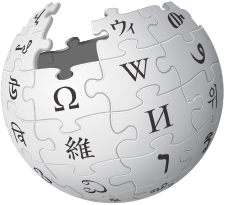 My curiosity was then diverted to finding out more about Wikipedia, the on-line
encyclopedia which I visit several times each week. What exactly is it, how did
it get started, and where does it get its content?
My curiosity was then diverted to finding out more about Wikipedia, the on-line
encyclopedia which I visit several times each week. What exactly is it, how did
it get started, and where does it get its content?Wiki Quick
By Wayne Maruna
Searching the Netflix streaming site for something to fill an evening, I came upon a BBC series called Shetland. I was drawn in by its images of rocky coastlines, rugged green expanses, and cloudy skies, and its haunting soundtrack. I had heard about Shetland sheep dogs and Shetland ponies, but watching the series piqued my curiosity about where Shetland was, so I reached for my iPad and did a Google search. I reflexively clicked on the Wikipedia entry for Shetland, which revealed that the Shetland Islands are an archipelago 256 nautical miles off the northeast corner of Scotland and 291 nautical miles west of Norway, and are considered part of Scotland. So much for today’s geography lesson.
 My curiosity was then diverted to finding out more about Wikipedia, the on-line
encyclopedia which I visit several times each week. What exactly is it, how did
it get started, and where does it get its content?
My curiosity was then diverted to finding out more about Wikipedia, the on-line
encyclopedia which I visit several times each week. What exactly is it, how did
it get started, and where does it get its content?
Back in my youth – you know, back before Bic pens – I remember the door-to-door salesmen selling the Encyclopedia Britannica. We never had the money for one, but my father’s parents had an encyclopedia set – I can’t recall if it was Britannica or the World Book Encyclopedia. For most of us with modest means, research on any subject required a trip to the library’s reference section. You could not check out encyclopedias and there were no copiers back then, so you had to be prepared with a lot of ruled writing paper.
Fast forward about 40 years to a time when home computers were becoming commonplace and the DVD optical disk drive allowed for encyclopedia programs like Microsoft Encarta to bring affordable encyclopedic knowledge to the masses, replete with colorful video content.
Then came the internet, and everything changed. In 2001, a fellow named Jimmy Wales started a venture called Nupedia with a goal of creating a free online encyclopedia written and edited by experts in their various fields. Wales hired Larry Sanger to work on the project. But the going was slow, and ultimately a side project dubbed Wikipedia was created to aid in content creation to be edited and fed into Nupedia, though with Wikipedia’s success, Nupedia was eventually abandoned. ‘Wikipedia’ is a combination of two words: encyclopedia, and wiki (from the Hawaiian word for ‘quick’). Wiki is also the name given to a technology for creating collaborative websites. This means that many, many people can create and edit the content of Wikipedia simultaneously. It is estimated that there are between 70 and 80 thousand active contributors (largely anonymous volunteers) working on more than 41 million articles in 295 languages, with about 5.5 million articles in English. More than a million people have edited at least one entry. (Honestly, I had no idea there were 294 languages on our planet. We should probably get together and talk about that.)
A 2013 article in The New York Times Magazine reported that Wikipedia gets more than 20 billion page views and roughly 516 million unique visitors per month – and that was four years ago! Currently, according to their own website, Wikipedia is the fifth most visited website in the world, behind Google, YouTube (owned by Google), Facebook, and a Chinese search engine called Baidu. Early on, Wales decided to not accept banner or video ads. He has long been a proponent of internet freedom, and this stance has resulted in his being excluded from the list of tech billionaires.
Perhaps because of his name, I’d always assumed that Wales was from the British Isles, but he is in fact from Huntsville, Alabama. He attended both Auburn University and Alabama, which college football fans would consider heretical. There is a British link, though, as his current/third wife was diary secretary to Tony Blair when Blair occupied No. 10 Downing Street, and the Wales couple continue to live in London. He is no longer involved in the day-to-day operation of Wikipedia, but was said to hold the unofficial title of BDFL (Benevolent Dictator for Life).
I don’t pretend to be close to Jimmy Wales, but I do get a Christmas card from him each year. OK, it’s not really a Christmas card so much as a December email asking for a donation to support the Wikipedia foundation which runs Wikipedia and provides for its servers and roughly 160 employees. For as much as I rely on Wikipedia, it doesn’t seem like an unreasonable request.
Oh, and in case you were wondering, other than the NY Times Magazine article, most of the content from this article came from……you guessed it, Wikipedia!